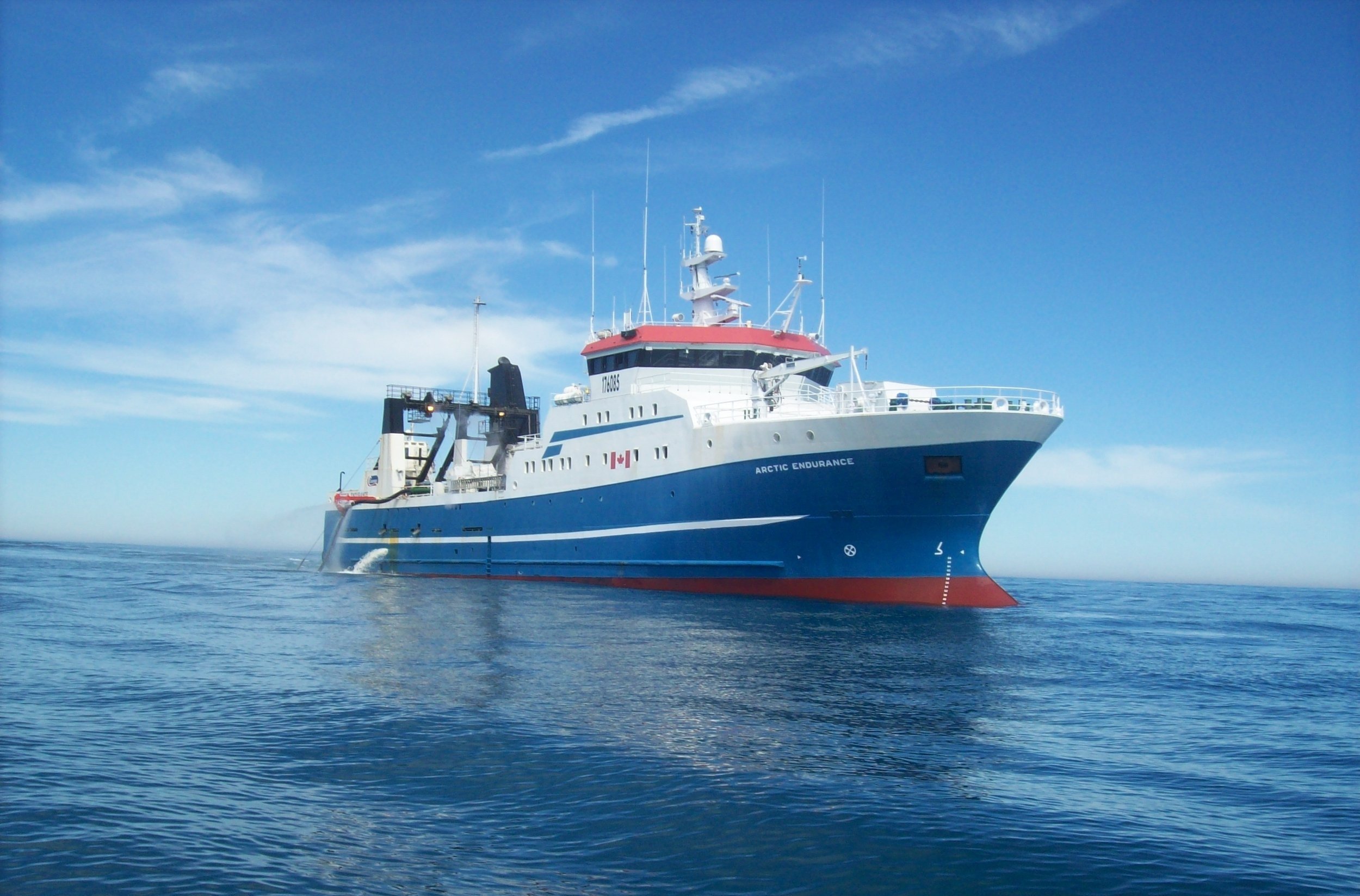Our People and Their Service
Strategic Priority
Nothing we do can be accomplished without an engaged, motivated workforce.
Landing the Big One: Providing Service that Makes a Difference
The Arctic Endurance is a fishing trawler in Clearwater’s fleet. (Photo courtesy of Clearwater Seafoods LP)
Fishing isn’t just a profession, it’s a way of life—a culture unto itself.
And historically, that unique culture has made it difficult to find transitional, return-to-work duties on land for fishers who are injured while at sea.
As Kyle Smith, WCB Adjudicator, and Kathy Cormier, Case Manager, with the Wholesale-Utility Integrated Service Team (WHLU-IST) have learned, finding transferrable skills for fishers is a challenge: The work they do on a boat is very specific to fishing, and highly manual. Another challenge is fighting the disdain fishers often have for working on land. They love being out at sea with their crew.
Kyle and Kathy have been working as a team with Clearwater Seafoods for years, trying to develop a program to keep workers who have been injured at sea connected to the workplace and each other while they recover.
Until recently they had little success, but in 2022, they landed the big one: A return-to-work program with transitional duties that work for both the fishers and Clearwater.
“Fishing vessels need maintenance,” explains Kyle, “and that often happens on land, in dry dock. Fishers have the right expertise to hep get a boat ready to go back to sea.”
Now, instead of watching the vessel sail out to sea while they recover, the fishers are doing safe, meaningful work still related to their industry. The work keeps them connected to their employer and coworkers and returns them to full-scale pay. The program even mimics their at-sea rotational schedule of a few days on followed by the same number of days off.
Kyle and Kathy give credit for the program’s success so far to Clearwater and the health services provider, Lifemark Bridgewater. “We all came together with a common purpose,” says Kathy, “to help fishers stay connected to the workplace and doing meaningful work within the sector as they recover.”
Kari Veinott, Kinesiologist, says she and her team at Lifemark made it their business to get to know the fishing industry inside and out so they could prepare fishers for a safe return to work either on the boat or on land.
“I’ve gone out on the boats,” says Kari. “The fishers know I understand their work.”
“We also do marine medicals here,” continues Kari. “I see the testing they go through to be cleared by Transport Canada to go out to sea. All of that helps me provide very targeted support for a successful recovery.”
Kyle also credits Clearwater for embracing a change like this so quickly. “For a company this size to help come up with the idea for this program, and then implement it right away is impressive. It’s good for the company because it will save them money in the long run. But it’s also great for the employees.”
Kathy echoes that. “Clearwater has been very pleased with the program. Having these valued workers back to work is so important because the work needs to be done, and who knows it better than the fishers themselves?”
“This is a perfect example of why relationships matter,” says Jason Slaunwhite, former Manager, WHLU-IST. “This is why we work so hard to forge relationships with employers, our service providers, and the workers we’re all trying to help. Transitional duties are part of best practice in return to work. Sometimes employers struggle with identifying those duties, but in this case, a team effort paid off.”
Our Progress
Implemented a hybrid workplace for our employees, supported by technology, and introduced appointment-based service for those we serve.
Mitigated operational risks by investing in technology solutions and training to protect the WCB’s security infrastructure against cyber threats, including enhanced disaster recovery capabilities in the event of natural or cyber disruptions.
Hired a Diversity and Inclusion Advisor as part of the WCB’s commitment to building a more diverse and inclusive workplace.
Integrated online mental health supports like Cognitive Behaviour Therapy (CBT) into Tiered Services Program offerings to enable improved return-to-work outcomes.
Implemented the expansion of presumptive cancer coverage for Nova Scotia’s firefighters.
Worked with the Office of Regulatory Affairs and Service Effectiveness (ORASE) to identify opportunities to reduce the administrative burden on the physicians who treat workers who are injured on the job.
Our Plans
Welcome a new CEO to lead WCB Nova Scotia as we embark on a new strategic plan, keeping Nova Scotians safe and secure from workplace injury.
Seek input from the people we serve, to inform our new strategic plan priorities.
Continue preparations for the possible compensability of gradual onset stress.
Apply updates to our core systems to support our people and our service.
Continue our diversity and inclusion journey as we build a workplace that employees are proud to be part of, and where they feel valued and appreciated.
Ensure our employees have the knowledge and tools to support our most vulnerable populations of workers who are injured on the job.
Improve the way we prepare new WCB employees to serve workers and employers.
Improve the Physician’s Report (Form 8/10) to make it easier and faster for physicians to complete.

